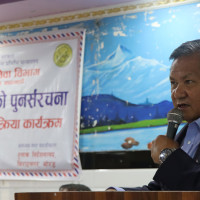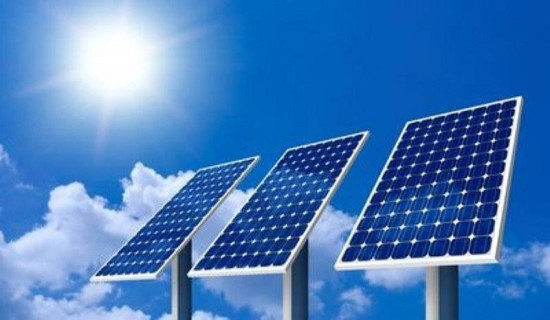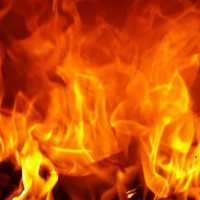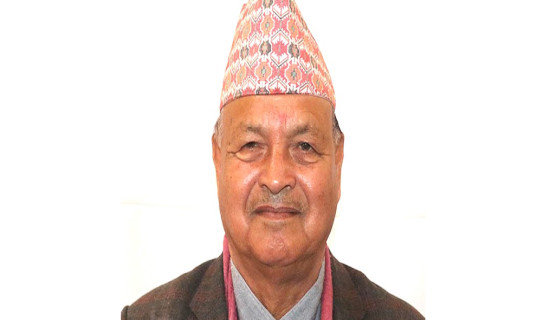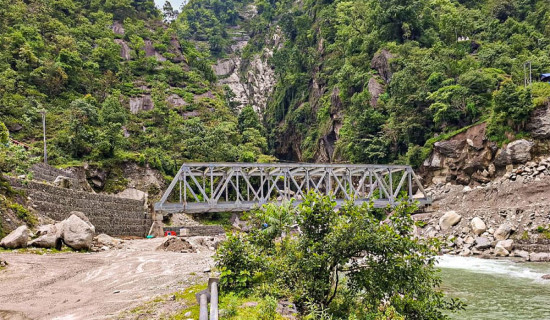- Saturday, 7 June 2025
Bloc Politics Is Reshaping Global Order
The trade talks between China and the US have stalled and the US imposition of tariffs worldwide continues to halt negotiated settlement. It leaves the prospects of global economic stability lingering. The unilateralism of the US has put its allies at unease and competitors alienated. This has forced great powers of the world to set new patterns of regional trade and political bloc politics and pursue multilateralism, a rule-based world economic and political order and show commitment to the UN principles while demanding its reforms and making it more representative, legitimate and relevant to resolve contemporary challenges of the world.
The US is in a dilemma. On the one hand, US President Donald J. Trump has allocated $175 billion for a multi-layered Golden Dome defence shield. It is a counterpunch against missile attacks against American security. This is likely to set off an arms race of great powers in space. President Trump prefers peace and order in the world but lacks the political will and resources to do so. On the other hand, he is inclined to pursue America First. Great powers must have learned a lesson that it is easy to get involved in wars but difficult to extricate. The tragedies of Vietnam, Afghanistan, Palestine, Iraq and Ukraine amply demonstrate this.
Power vacuum
The US has unilaterally withdrawn from the Anti-Ballistic Treaty, the Paris Climate Accord, the WTO and some specialised agencies of the UN, such as the WHO and Human Rights Council, creating a power vacuum and a deficiency of institutional muscle to implement the liberal order of peace, justice and sustainable development goals. Cooperation of two superpowers — China and the USA — is vital to settle the questions of global governance and stitch other major and small powers to a legitimate order of cooperation and peace.
US Defence Secretary Pete Hegseth speaking at Sangri La security dialogue in Singapore assured America’s Indo-Pacific allies that they would not be left alone to confront China’s growing military and economic power, suggested them to increase their defence spending and readiness and warned that “Beijing is credibly preparing to potentially use military force to alter the balance of power in the Indo-Pacific.” The strategic focus of Trump is still China, whether it pertains to Taiwan, stopping computer chips design software, warning against using chips made in China, Panama Canal, Greenland, Mexico, purchase of oil and gas from Russia, Sino-Iran ties or cancelling visas for Chinese students. In contrast, the G7 nations have expressed displeasure over China’s non-market global trade practices such as export subsidies and currency policy of de-dollarisation.
It is difficult to say whether the US can stop China’s peaceful rise by its strategic pivoting to Indo-Pacific, given its preoccupation to promote hegemony in Latin America, Russia-Ukraine and Israel-Palestine wars, nuclear ambition of Iran, security of East Asia and its partners’ different perception of China’s image, intentions and capabilities. Frustrated over the escalating wars in Ukraine, President Trump exhibited a change of stance and suggested that NATO provide strong air defence to Ukraine, freeze Russian oligarchs’ gold, impose more sanctions in conjunction with the EU and consider China and India complicit in war if they support Russia.
Does it mean that President Trump is rethinking to revive the security architecture of the Atlantic? Or does he just prefer to promote the defence scale-up of NATO nations and slightly revise its rules? The second round of Russia-Ukraine negotiations in Istanbul demanded a summit-level meeting of Ukraine, Russia and the US to finalise the ceasefire and peace deal and agreed on the mutual exchange of prisoners of war. Neither India nor Australia feels comfortable assuming the role of a countervailing power against China, as suggested by the USA. Both China and India defy American threats to buy Russian oil and gas.
India is not happy over the imposition of US tariffs. Trump is trumpeting that he mediated the Indo-Pakistan war, boycotted its mangoes, pressured to buy F-53 and threatened the CEO of Apple company, Tim Cook, not to manufacture its iPhone in India, otherwise face a 25 per cent tax, etc. India has also complained against the USA in the WTO and is seeking to revise trade rules. It is unhappy over the US military support to Turkey worth $225 million, sensing fear that it will supply arms to Pakistan and, therefore, considering a reappraisal of its trade. India is improving its defence cooperation with Israel, confronting wars on seven fronts. India has its own aspiration to become a great power, pursuing foreign policy of multi-alignment and leaders of the Global South rather than becoming a subordinate partner of the USA under QUAD.
What worries India is the entangled geopolitics of Myanmar, Bangladesh and Pakistan, which has impeded the climate of trust for cooperation. Russia has suggested reviving, Russia-India-China (RIS) dialogue set up in the early 1990s to oppose Western hegemony. These three nations are tied by BRICS, SCO and the New Development Bank and share many agendas of the Global South, including the perception of the emergence of a multi-polar world order, the necessity of multilateralism in the future and regional cooperation. The Global South is thus forming its trade bloc without Western oversight, which is changing the rules of trade, supply chains, technology transfer and control of world trade.
The Chinese way of winning is cooperation without fighting a brutal war, which it has eschewed for forty years. It has shown interest in a new Asian alliance for a new Asian Union. Chinese Premier Li Qiang, in the opening of the joint Association of South East Nations (ASEAN) and Gulf Cooperation Council (GCC) meeting, remarked that global geopolitical tensions have offered a strategic opportunity to bring 20 nations together to closely cooperate on trade, supply chains, infrastructure, finance and AI. This is the biggest trading bloc with a combined GDP of $425 trillion, 2 billion population and 55 per cent of the world’s GDP growth, providing greatest leverage in world politics. Accordingly, it has set up a global mediation group in Hong Kong with 30 nations from Indonesia to Cuba, aiming to handle differences and conflicts through dialogue and consensus based on the UN Charter.
China’s peaceful rise can be attributed to its Confucian ideology of the creation of a peaceful world order, contrary to the realist version of world politics. This liberal ideology inspired the US and European nations to support its rise, provide entry to their institutions and enable them to checkmate the expansion of the Soviet Union. Its global leadership in cutting edge technologies, highest trading nation of the world with more than $ 1 trillion surplus, largest reserves of US dollars ($375 trillion), biggest producer and supplier of rare earth minerals and largest manufacturer of the world has provided it corresponding role to play in shaping new world order. But now the US strategists think that Russia is not the Soviet Union and their power, population, technology and military strength can easily match of Russia.
But, to them, China’s population, economy, technology and military might are disproportional to other Asian powers, which can make them adjust to this reality and challenge American domination in the region. This is the reason the current resetting of US-Russia relations is aimed to contain China’s phenomenal rise. But the US strategy to wean Russia away from China and India from Russia largely proved feeble. Russia’s distrust arises from the expansion of NATO at its doorstep and support to Ukraine, while India reflects the bitter memory of the American support to Pakistan in its war, non-transfer of critical technology and India’s own civilizational self-image of world teacher. The Indian foreign policy of keeping strategic autonomy makes sense from the Indian perspective.
The UK and EU are making a post-Brexit reset to reshape a new bloc of politics in Europe. The European great powers UK, France, Germany and Poland, are coming together to cope with their geopolitical challenges and supporting Ukraine against Russia. Germany, the second largest supplier of aid to Ukraine, pledged to support Ukraine to manufacture its own missiles and reduce dependence on others. The European nations will continue to build their own defence and support NATO even if the US has declining interest in it, the WTO and the UN. The three member nations of EU — Slovakia, Bulgaria and Hungary are keeping close ties with Russia.
Following its differences with the US on tariffs and security, the EU is pivoting to China on trade and investment and abandoning its policy of decoupling following Sino-Russian growing amity. Chinese President Xi Jinping, speaking to the German Chancellor and French President, suggested working together for a global economic order and stability. He also favoured multi-lateral trading regimes. China has replaced its supply chains from the USA to Australia, Brazil and Russia.
China has donated $ 500 million to the World Health Organisation, stepping into the gap left by the US withdrawal. It has also extended humanitarian supplies to Palestinians in Gaza. The Chinese support for Palestinian sovereignty brings all Islamic states’ affinity to China and respect from them, irrespective of the regime in power. Even the traditional defence allies of the USA, such as Saudi Arabia, United Arab Emirates, Turkey and Pakistan, are its biggest trading partners. China helped to improve the diplomatic ties of Iran and Saudi Arabia. China and Malaysia, in a joint statement, said that Gaza is an integral part of Palestine, not open to multiple interpretations.
President Trump has issued a warning that if China intervenes in Israel, the US will take action. Russian President Vladimir Putin reacted, “Trump should stay out where it is not called for. China is not alone; Russia will side with it.” The Israeli military solution to Middle East problems is also opposed by Canada, the UK and France. Enforcement of a two-nation solution fits well with the existence of both Israel and Palestine rather than the escalation of regional low-intensity, localised conflict into full-scale wars.
The nation of the African continent is united by their indigenous vision and cultural aspiration for autonomy in world politics and utilise internal economic and natural resources to achieve the goals of decolonisation. The May 26-30, 2005, meeting of the African Development Bank Group aimed to make Africa’s capital work better for the continent’s development. It discarded the dominance of foreign aid in their development and sought to look inwards to their region’ own rich, social, natural and financial capital.
Shifting alliances
Togo, Niger, Mali and Burkina Faso and South Africa abandoned their Western affiliation and increasingly relied on BRICS nations. As South African President Cyril Ramaphosa failed to reset ties with the US, he is hoping that he will be able to hand over the presidency of the G20 to the US President at the November meeting of this group in his nation. In South America, Venezuela is shifting its oil and gas cooperation from the West to the BRICS nations. China and Mexico have signed a deal to invest in Mexico’s business supply chains all over the nation.
China’s $330 billion deal with Canada on energy has shaken the US trading clout in the neighbourhood. Canada has also reset its ties with Europe and India. The shifting ties of the US with allies and competitors have thus contributed to the formation of new trading regimes and new bloc politics, some even transcend regional groupings. The emerging groupings are necessary for improving functional cooperation but not sufficient for a global order of peace and justice and the distribution of global public goods. The UN still serves as a vital platform for different scales of power to negotiate their differences and set a common rule for global governance and resolve the problems of a global scope.
(Former Reader at the Department of Political Science, TU, Dahal writes on political and social issues.)



-original-thumb.jpg)

